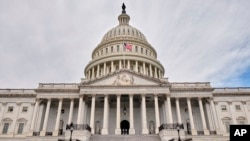U.S. House Democrats dropped opposition on Thursday to a bill passed by the Republican-controlled Senate that would release $4.6 billion in emergency funds to address worsening humanitarian conditions for migrant children and families on the U.S.-Mexico border, lawmakers said.
Leading Democrats in the House of Representatives said the chamber was likely to vote later Thursday on a spending bill, approved by the Senate on Wednesday.
A photo of two drowned migrants and reports of horrendous conditions for detained children have spurred efforts to craft compromise legislation to send to President Donald Trump before Congress breaks this week for the U.S. Independence Day holiday.
House Speaker Nancy Pelosi gave in to pushback from moderate Democrats and dropped plans to add migrant protections to the Senate bill.
"At the end of the day, we have to make sure that the resources needed to protect the children are available," Pelosi said in a statement. "In order to get resources to the children fastest, we will reluctantly pass the Senate bill."
Pelosi and liberal Democrats had earlier planned to amend the Senate bill to set health standards for facilities holding migrants, establish a three-month limit for any child to spend at an intake shelter, and reduce spending for the Immigration and Customs Enforcement agency.
Trump has made cracking down on illegal immigration a centerpiece of his administration but officials are saying they will soon run out of money for border agencies.
Border apprehensions hit their highest level in more than a decade in May, straining resources and creating chaotic scenes at overcrowded border patrol facilities. Many of the migrants are either children or families, mostly from Central America.
"Children are suffering at the border and we must act now to stop it," Representative Ben McAdams wrote on Twitter.
Lawmakers in the House stood for a moment's silence on Thursday out of respect for migrants trying to cross to the United States.
The conditions of unaccompanied children crossing the border has become a key issue in the 2020 presidential race. During a debate Wednesday night, many of the Democratic candidates called for an overhaul of U.S. immigration laws and about 12 of them are set to visit a Florida facility this week.
A photo of Salvadoran father Oscar Alberto Martinez and his toddler daughter Angie Valeria who drowned attempting to cross the Rio Grande added urgency on both sides of the aisle to reach a funding deal.
'Deplorable' conditions
Lawyers and human rights workers said they found sick and hungry children when they visited the Border Patrol facility in Clint, Texas.
"Many had been detained for weeks, one even up to a month in really horrific conditions," said Clara Long, senior researcher at Human Rights Watch.
Attorneys representing migrant children filed papers Wednesday in federal court in Los Angeles asking that the U.S. government be held in contempt of court for "flagrant and persistent" violations of the terms of a 1997 agreement that governs the treatment of children in immigration detention. They requested immediate action be taken to remedy the "deplorable" conditions.
The renewed focus on conditions on the border has also galvanized opposition in recent days to a Trump administration policy that sends asylum-seekers to some of Mexico's most violent cities.
In an open letter to Trump and other political leaders, a coalition of evangelical churches said it was "deeply troubled" by the policy which it said left children vulnerable to violence and trafficking, as well as by reports of "inhumane" conditions in U.S. federal immigration facilities.
The Catholic diocese of El Paso, Texas, separately denounced a critical lack of shelter, food, legal aid and basic services for asylum-seekers returned to Mexico under the program and "distressing detention conditions" in the United States before they are returned.
In court papers filed Wednesday, a union that represents asylum officers at U.S. Citizenship and Immigration Services described the program as "fundamentally contrary to the moral fabric of our nation," citing the American tradition of sheltering the persecuted stretching back to the arrival of "Pilgrims onto a Massachusetts shore in November 1620."


